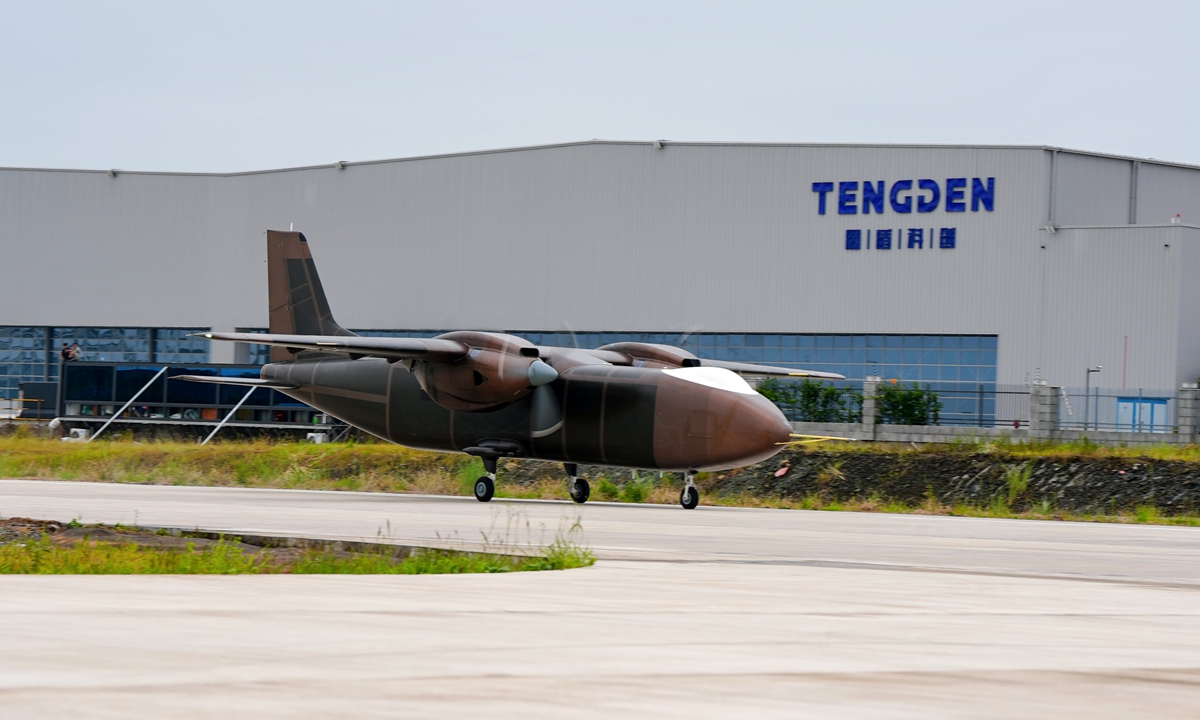
China's new homegrown twin-engine unmanned transport aircraft. Photo: Courtesy of Sichuan Tengden Sci-tech Innovation Co
China's new homegrown twin-engine unmanned transport aircraft, with a maximum range of 1,800 kilometers, is a milestone in the country's low-altitude technology, the manufacturer of the unmanned aerial vehicle (UAV) told the Global Times on Monday, adding that the development of the UAV, which only takes 15 minutes to load cargo, will significantly raise regional logistics efficiency.
The UAV, designed to meet rising market demand,
completed its maiden flight test on Sunday in Zigong, Sichuan Province, Southwest China, representing the country's largest fully domestically produced unmanned transport aircraft to date.
The groundbreaking UAV went from development to its first flight in just over a year, producer Sichuan Tengden Sci-tech Innovation Co told the Global Times in an exclusive interview on Monday. Analysts said such rapid success highlights the maker's leading position in UAV technology and reflects China's achievements in its booming low-altitude sector.
The aircraft, designed for regional logistics routes of 600 to 1,800 kilometers, will address the inadequate payload capacity and range seen in similar products, a manager of the company who requested anonymity told the Global Times.
"It proved that large-scale commercial adoption of unmanned regional logistics is feasible, and is expected to drive technological advancements in the industry that better meet the expanding market demand," the manager added.
This UAV breaks new ground in regional logistics efficiency by using cutting-edge technologies, reflecting China's prowess in low-altitude technological innovation. It boasts high automation, with more than 90 percent of its functions controllable by a single button, streamlining operations and making it highly suitable for widespread use in unmanned cargo transport.
With the largest cargo hold in its class, the UAV increases space utilization by 15 percent. It fits standard cargo containers and integrates with mainline transport without disassembly, requiring only 15 minutes for cargo loading and unloading.
The aircraft also features a high-altitude performance with a ceiling of 7,000 meters, making it ideal for global cargo transport, the company noted, saying it covers more than 90 percent of feeder routes globally and has advanced fireproofing and anti-icing features for enhanced safety.
To address technical challenges, the company employed an entirely composite structure to reduce the UAV's weight, thereby maximizing cargo space and capacity. It also integrated its latest autopilot technology to enhance the UAV's ease of use.
"This approach, involving the development of a new model from scratch, has proven to be more demanding in terms of product design and manufacturing compared to merely modifying existing models," the manager said.
China's unmanned logistics industry is picking up pace with the growing use of drones and smart systems, as domestic airspace and flight route management systems open faster and the construction of general aviation airports accelerates.
For instance, Central China's Henan Province recently issued a plan to enhance low-altitude economic development, aiming to build about 10 general aviation airports and a batch of helicopter and drone landing sites by 2025 to complete the province's low-altitude infrastructure, people.cn reported on Monday.




